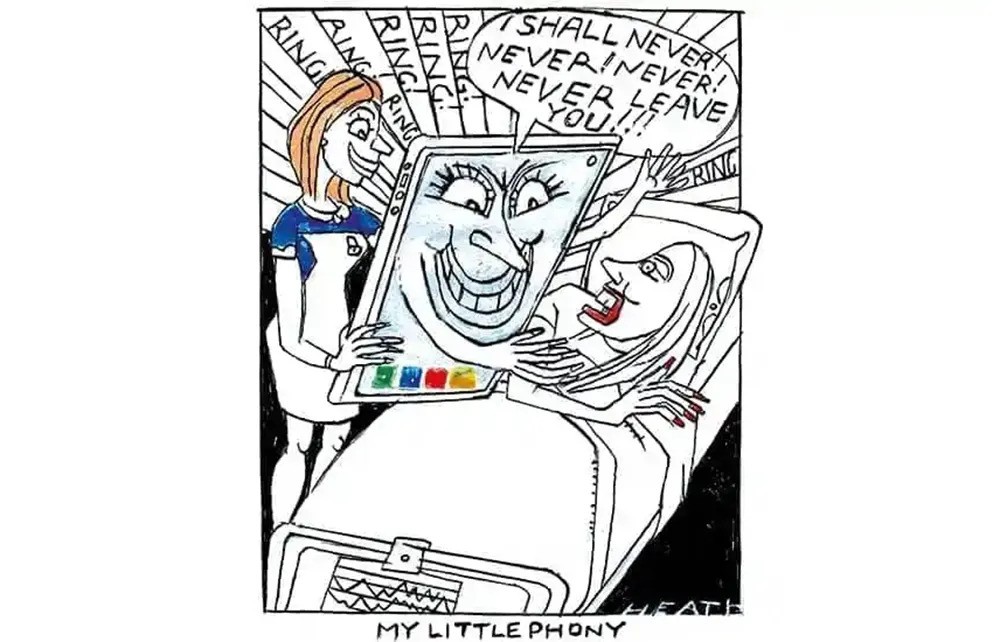A few years ago, calling for a ban on smartphones for under-16s would have seemed alarmist – a minority viewpoint from pessimistic Luddites and sceptical old fogeys. Now, the idea is not so much a moral panic but a moral consensus: 83 per cent of parents with at least one child between ages 4 and 18 believe that smartphones are harmful to children. Around 58 per cent back a smartphone ban for under-16s, while for primary school parents, support is at 77 per cent.
The MP Miriam Cates has called for a total ban on young people having smartphones and social media to help combat a rise in ‘children addicted to pornography.’ Esther Ghey, the mother of murdered teenager Brianna Ghey, is campaigning for a similar ban, and for software to ensure that any ‘inappropriate searches’ are flagged on parents’ phones. Similar suggestions have been made by actress and campaigner Sophie Winkleman. Ian Russell, whose daughter Molly took her own life after looking at self-harm content online, has warned that regulation has led to ‘little change’ and social media is still pushing dangerous content to millions of people.
The tide is also turning globally. Florida’s governor Ron DeSantis signed a bill this week to ban under-14s in the state from having social media accounts and make platforms erase any already created. In Utah, under-18s already cannot use social media between 10.30pm and 6.30am. France recently introduced a new law requiring social media platforms to verify users’ ages and obtain parental consent for those under 15, while the EU Digital Services Act has banned targeted advertising at children. In China, TikTok users under 14 can only use the app for 40 minutes a day.
I can’t tell you how many times I have downloaded and deleted productivity apps
As usual, the UK lags behind, weighed down by the bloated, bureaucratic mess that was the Online Safety Bill. Michelle Donelan, the technology secretary, has said that the government is looking at banning children under 16 from buying mobile phones as part of a new consultation. However, given that any law would only ban the sales of mobile phones directly to children, and not stop parents from buying phones for their children, this seems as useful as a glass hammer.
Despite the overwhelming evidence that smartphones fundamentally rewire children’s concentration spans, sleeping habits, self-esteem, social interactions, physical exercise, sexuality, mental health, body image and more, parents still continue to hand them out as a rite of passage: 91 per cent of children own a smartphone by age 11. We have normalised a completely abnormal environment for our children and young people.
There are three main reasons for this. The first is ‘pester power’: parents fear their child will be socially isolated without one, and so give in to the pre-teen battlecry heard in every household across the UK: ‘Well everyone else has one!’ The second, to quote Rod Liddle, is that a smartphone is a ‘gift of neglect masquerading as benevolence.’ Smartphones, for many parents, are the ‘post-toddler equivalent of a dummy’, ‘relieving them of the task of either engaging with [their kids] or parenting them.’
The third is that we have bought into this fallacy that devices are already so omnipresent that the best thing we can do is ‘educate’ our children on how to use phones ‘safely’ and ‘in moderation’. This is all well and good, but it never works in practice. I can’t tell you how many times I have downloaded and deleted productivity apps; tried to sign myself out of Instagram only to log back in hours later; put time limits on my internet use, only to jab ‘15 more minutes’ every 15 minutes. How can we expect hormonal adolescents, with their malleable minds, to be able to overpower something that is designed, in every way imaginable, to keep them engaged for as long as possible? Grown adults can’t control their screen time – reports suggest that adults touch their phone over 2,500 time a day – and yet we expect 11 year olds to be able to ignore the pull of a push notification, or moderate the dopamine rush of their daily scrolling?
To be fair to parents, there have been some admirable attempts at collective action, such as Parents United for a Smartphone-Free Childhood. Yet technology continues to transform our lives, and policy fails to keep pace. Meanwhile we are sleepwalking through this strange social experiment, shrugging our shoulders at the fact that what should have been an intermittent resource has now become a constant crutch.
The fact the public mood seems to be shifting gives me reason to hope: a backlash against Big Tech and its chokehold over our lives is building, and now the government just needs to be brave enough to consider serious options. This could be banning smartphones outright for under-16s, or it could be only allowing the sale of ‘child-friendly’ so-called ‘dumb phones’. For example, the Nokia 6300 enables you to use WhatsApp and Maps, but no other social media apps, therefore reassuring anxious parents who say their child simply has to have a smartphone in order to get home safely. The options are there, we just need to look up from our screens long enough to do something about it.






Comments